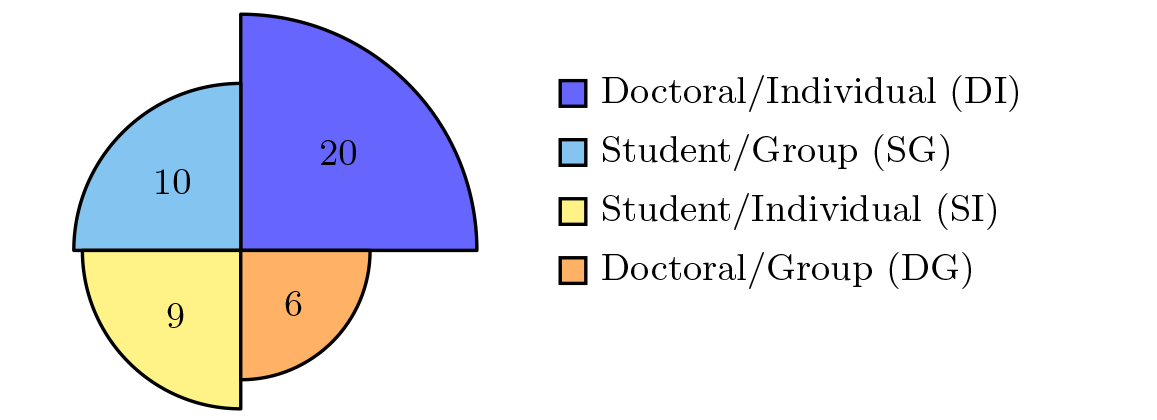 Web Content Display
Web Content Display
 Web Content Display
Web Content Display
 Web Content Display
Web Content Display
 Web Content Display
Web Content Display
 Web Content Display
Web Content Display
Results of the Talent Management mini-grants call (February 22, 2021)
We are pleased to announce the results of the first “Talent Management” mini-grant call within the framework of the Anthropocene Priority Research Area (PRA).
The call was addressed at students and doctoral candidates enrolled at the Jagiellonian University and intending to obtain funding to pursue either research or outreach projects. Topically, the call scope revolved around the problems of the Anthropocene, while implementation-wise the applications were assessed for congruence with the 4I principle encompassing interdisciplinarity, internationalization, integration and innovation. The mini-grant proposals were submitted either individually or by teams, and the proposed projects could be planned for up to 18 months with a budget of up to 50000 PLN.
Applications were collected and handled through the brand new “strefaid.uj.edu.pl” proposal submission and evaluation system. The evaluation of the submitted proposals was handled by an inter-faculty committee. Meetings of the committee were attended by representatives of both the JU Student Council and the PhD Students’ Association. Following formal eligibility check, 60 proposals were sent out to reviewers selected from within the eight university departments participating in the Anthropocene PRA. Each proposal was assessed by two reviewers evaluating the project according to the publicly available “Proposal evaluation criteria”. The reviewers remain anonymous, while both the comments from reviewers as well as the points granted will be accessible to the applicants in the submission system. The maximum score a proposal could attain in the assessment was 150 points. Following reception of all 120 reviews, the call committee decided to request additional reviews for proposals with contrasting reviews (five cases). Average score from the reviews was used as the ranking criterion.
The committee approved granting funding for proposals with a note of over 100 points what resulted in offering support to 45 projects in the total amount of 1 889 774 PLN. The list of successful mini-grant proposals is given below.
Each project will be carried out under the mentorship of researchers affiliated with the Jagiellonian University, the breakdown of mentors’ affiliations for the winning grants is depicted below:
 |
Among the supported projects, there were individual and group projects led by students and doctoral candidates with the following split:
 |
Let us thank all the applicants and mentors who responded to the call, and congratulate the successful in- dividuals and groups who will receive further details shortly. Subsequent edition of the “Talent Management” call is planned for next year.
|
Points |
Title |
|
|---|---|---|
|
147 |
DI |
Bivalve shells as biogeoarchives of environmental conditions |
| 144 | SG |
Violence against women during pandemic |
| 144 | DG |
Influence of tropical forest deforestation and depth of basal rock on biodiveristy and occurence of phasmids (Insecta, Phasmatodea) of Sabah (Borneo, Malaysia) |
| 142 | SG |
Li-ion batteries recycling for circular economy approach |
| 140 | DG |
Fossil record of roads in the inland dune sediments |
| 138 | SI |
Emerging contaminants as a challenge for the implementation of the sustainable development goals |
| 138 | DI |
Journey to the West? Comparative Analysis of Sociotechnical Imaginaries of Future Energy Governance in China and Hong Kong |
| 136 | DI |
Very short migrations. Does river fragmentation restrict availability of summer refugia for riverine fishes in the conditions of climate change? |
| 136 | DI |
Consequences of land use change and agricultural land abandonment in Poland |
| 135 | DI |
Determining reasons of the increase of Covid-19 incidence among people sufferring from civilization diseases |
| 135 | DI |
Dynamics of population models described by partial differential equations |
| 134 | DG |
The essential oils as natural pesticides. The investigations on the effect of the mixtures of terpenes on models of phytopathogenic bacterial membranes |
| 133 | SI |
Soil moisture changes in Narew National Park |
| 129 | SG |
Anion exchange membrane fuel cells - modern and sustainable energy source as a way to reduce environmental threats |
| 128 | DI |
Impact of different types of tundra vegetation on content and molecular composition of soil organic matter in permafrost-affected soils of the central part of Spitsbergen (Svalbard) |
| 127 | DI |
The past as the key to the future-crisis of ’carbonate factory’ and the possibilities of its regeneration in the context of ocean acidification |
| 126 | DI |
The influence of nanoplastics on biomembranes - aspects of cytotoxicity |
| 126 | DI |
Variability in high-level cloudiness in context of climate change and anthropogenic factors |
| 125 | SG |
Environmental issues in the Arctic: glacier retreat and microplastic pollution |
| 125 | DI |
Valorization of fly ashes from energy sector towards of obtaining functional materials used in catalysis |
| 124 | DI |
The solution is at hand: zeolite for utilizing plastic waste in the friendly manner |
| 124 | DI |
Induced polyploid metallophytes of the Arabidopsis genus for phytoremediation purpose |
| 123 | SG |
Comparative analysis of climate youth social movements and organizations in selected cities of Central Europe - do young people have a voice? |
| 122 | SI |
Optimization of the properties of the supported cobalt-based catalysts towards an efficient hydrogen production from bioethanol |
| 122 | DG |
Monitoring environmental pollution by toxic organophosphorus compounds using zero-field nuclear magnetic resonance |
| 120 | SG |
Sources and occurrence of microplastic in rivers |
| 119 | DI |
Suburbanisation and water cycle in small foothill catchments |
| 119 | SG |
Popularising climate catastrophe and anthropocene related topics among JU students and the University’s environment |
| 118 | SI |
City as a symbol of Anthropocene |
| 117 | SG |
Human awareness in the age of ecological crisis: Grassroot initiatives of local communities and NGOs for environmental protection |
| 117 | DG |
Impact of Beavers dams on water circulation in small mountain catchments |
| 115 | DI |
On-line is ‘green’ – integrated sample pretreatment for the determination of antiviral drugs in surface waters |
| 115 | SI |
CRISPR/Cas9- an Ally or an Adversary of the Sustainable Development Goals? |
| 113 | SI |
Development of collaborative platforms in the European Union from the standpoint of sustainable development |
| 112 | SI |
Tolerance and accumulation of heavy metals by cells of metallophytes – how do plants cope with heavy metals |
| 112 | DI |
’Astrolabium’ National Competition in Astronomy |
| 110 | SI |
Multidimensional spatial analyses of Cherven Towns in the aspect of studies on the Antropocene boundary |
| 109 | DI |
Nickel-ruthenium selenide as a catalyst for electrochemical hydrogen evolution reaction |
| 108 | DI |
Experimentalist governance and environmental protection. Evidence from the case of the EU external aviation policy |
| 106 | DI |
Sustainable Development Chapters in new-generation trade agreements concluded by the EU. Comparative study |
| 106 | DI |
Financialization and environmental goals of 2030 Agenda |
| 104 | SG |
Anthropocene and health aspect of Sustainable Development. Can natural alginate polymeric films aid in implementation of the Agenda’s priorities? |
| 103 | DG |
Pandemic-ecological crisis and organizational resilience. Folk universities case study |
| 102 | SI |
Cost effective and simplified synthesis of functional polymer brushes by biocompatible ATRP methods free of toxic copper compounds |
| 101 | SG |
ACtivating educaTION (ACTION): vaccines |
|
D/S I/G
|
Doktorancki/Studencki Individual/Group
|

